
Ticketmaster to Unveil Fee Transparency at Biden Event
Major ticketing websites including Ticketmaster and SeatGeek Inc. will announce transparency initiatives designed to make it easier for
2023-06-15 19:25

Eddie Huang: ‘I’ll never eat at BAO London – I know mine’s better’
For a decade, Baohaus was one of the best-known restaurants for Taiwanese fare in New York City. According to Eater, the restaurant “helped lay the cultural and culinary groundwork for an ambitious class of modern Taiwanese spots” in the city. It also catapulted founder Eddie Huang to fame as his culinary expertise was thrusted into the spotlight with shows on the Cooking Channel (Cheap Bites), Viceland (Huang’s World) and MTV (Snack Off). He first opened Baohaus on the Lower East Side of Lower Manhatten in 2009, before relocating it to a bigger venue in the East Village. During the 10 years he ran Baohaus, Huang also wrote his memoir Fresh Off The Boat, which led to the TV series of the same name, starring Randall Park and Constance Wu. But in 2020, around seven months into the coronavirus pandemic, Huang announced that Baohaus would be no more. At the time, he wrote in an Instagram post: “I opened this restaurant to tell my family’s story through food at a time when no one was giving Asian Americans a chance in TV, film, books or media generally.” Since then, however, things have changed drastically for the diaspora; this year, the celebrated Asian-led cast of Everything Everywhere All At Once clinched seven Oscars, including Best Picture, Best Actor (Michelle Yeoh) and Best Director (Daniel Kwan and Daniel Sheinert). Now, Huang is casting his eye back to Baohaus, but this time he’s bringing it across the pond and into London. His three-month residency at Neighbourhood in Islington – which previously held “ramen junkie” Ivan Orkin’s Ivan Mazemen residency – will dominate this summer with his signature Taiwanese baos, fried chicken and noodle dishes, bringing a bowl of the Big Apple to the Great Smog. I sat down with Huang over a steaming, fragrant bowl of Taiwanese mince pork stew and rice to talk about what Baohaus’ legacy in New York was, its future in London, and what it means to have a vision. How did it feel when you closed Baohaus in NYC? I always loved having Baohaus. I never intended to close it, but the pandemic hit and I went to Taiwan to be safe, but our landlord kept on charging rent in New York. I just didn’t see an end to it. I’ve been wanting to reopen for a while but when I got home, I had to immediately get to work promoting Boogie. It was kind of bittersweet, but I try to think about everything from a more existential perspective. To have owned a restaurant for 10 years in New York while writing a memoir and doing all these shows, and then directing my first film… I just felt an immense sense of accomplishment and I felt like it was really a part of the fabric of downtown New York. So many people had come through those walls and it meant so much to me, so I was just really proud even though it was closing. It forced me to look back on everything and I had a sense of gratitude and pride, and I wasn’t angry at all. I think I was sad that it was closing, but thankful to the universe for the time that I did get. Baohaus left a legacy for Taiwanese food in New York that spread across the rest of the Western world. How does it make you feel? Even when I go back to Taiwan, people will say, ‘Yo, that’s the pork bun kid’. That’s my name back home. I’m very, very grateful that I made a lot of people happy and Taiwanese people were proud of it, and that New Yorkers were proud of it and loved it. But now, starting it back up in London is just par for the course for me. I’ve never lived in one place. Born in DC, grew up in Orlando, made New York my home. I would say I identified with New York more than anywhere else. I got dragged to LA for my work and then now I got dragged out to London to open Baohaus, so this [Neighbourhood] is now the new home base for the next three months. But the idea is to then start to look at brick and mortar spaces in London and hopefully make it more permanent. What makes Bao Haus stand out? There’s a lot of Taiwanese cooking in London now. What really defines my cooking is there is a straight line between my grandma, my mother, and myself. There are very, very small things I do to adapt it up for my taste or modern tastes, but it’s not adding trendy ingredients or smashing things together. For example, this mince pork stew is how my grandma and my mum would make it. The only thing I pay more attention to is knife skills and the exact cut of the pork belly mixed in with the ground meat. It’s the same with the Chairman Bao, it’s exactly like the baos you get in Taiwan except that I red-cook my pork instead of brown braising. So I stay within the Taiwanese pantry, but I really work on the technique. I read that you don’t really like being called a chef. What don’t you like about that chef territory? The thing is, I definitely think cooking is an art, right? Even the guy selling a dollar bowl of rice is just as artistic to me as somebody doing a tasting menu. But I feel like every generation has these chefs whose food always has to be about them. It’s less about culture and community, and more about, ‘Check out my new idea, my new thing’ and none of it ever has staying power. I get disappointed going to a lot of young chef restaurants because they’re working their s*** out and they want you to pay for their food because they feel they’re being creative. Like, ‘Because we were being creative, you should f***ing pay us and buy our food’. And I’m like, well, this just doesn’t taste f***ing good. If you’re going to charge people this, s*** should be good. There’s a lot of ego. A lot of people didn’t set out to be chefs, they say, ‘I was in fashion or I was in music, or I was a director and I busted out and ended up in food’. People see food as a place they can be all artistic and they think they can creative-direct a restaurant, but this s*** is a lot harder than you think. You can have a cool brand and a great vibe, but to keep people coming back for 10 years, your food’s gotta be really good and be a good deal for your customers. Everything is exciting when it’s new, but does it stand the test of time? Do you keep thinking about it the next day? Are you a perfectionist? Here’s an example: chips. We were known for our taro fries in New York. I did taro fries because you can get French fries anywhere, and they go great with our food, but I wanted to do something different. So I would brine the taro, black it and then double fry it, and they were some of the best fries I’ve ever had and people went nuts for them. But it’s much harder to source taro here in London, because I want the whole fresh taro, not frozen. It was proposed that we do French fries, but they were bringing in frozen ones. But I didn’t want anything like that on our menu that isn’t the best version of it. I guarantee you everything on our menu is the best version you can get here in London. No one’s going to touch my bao. I know there’s another place here, BAO. I’m not even going to eat there. I know mine’s better. I will not try it. I will not. So, back to the fries, I said those fries aren’t going on my menu because they’re not the best fries. So now we’re sourcing all kinds of potatoes. Certain restaurants like St John’s only have chips seasonally when the potato is consistent, and I like that. I like when people are like, when it’s good, it’s good, and I will serve it to you then, and when it’s not good, I’m not going to serve it to you. That philosophy needs to be adopted by more. You don’t have to serve everything, you don’t have to do everything. You don’t have to be the most clever. Just be the best version of you and do what you do best. You know, I got a dozen madeleines from St Johns and I smuggled them all the way back to LA. My wife was like, ‘Dude, are these going to be good?’ After my flight and then another day in between, I heated them up and they were phenomenal. I gave some to my dogs – my dogs got to eat St Johns madeleines! They went crazy. You used to host a TV contest show called Snack, where people got random ingredients and had to make something with it. What’s the best thing you made with random ingredients? I invented the Cheeto fried chicken. It happened when I was really high one night. I didn’t have any bread crumbs, so I crushed up Cheetos in a bag, then coated the chicken and fried it. This s*** is crazy. It was a lot of fun but I spent a lot of time on it and then I found the right Cheetos, the right cheese dust, and I think we really perfected the dish. We only offered it once a year on 4/20 at Baohaus, it became a tradition. So if we have a brick and mortar space in London, I would absolutely bring the Cheeto fried chicken bao back only on 4/20. You’ve worn a lot of hats in your lifetime, restaurant owner, chef, author, director, fashion designer. How do you feel about hustle culture? Everything right now is based on the image and identity that you’re selling. Who are my friends? How do I dress? How am I curating my life? What starter pack do I fit into? I get it – I definitely think it’s important to work extremely hard because it’s hard to make money right now. The income inequality gap is insane and my solution to that is to acquire a skill and just refine it. If you have a tangible skill, you’re already ahead of most people in your generation because most people have knowledge and contacts and willingness, but do they have an actual skill? For example, the idea of a creative director is just so funny. What’s the skill? There’s very few creative directors who are skilled and honour the craft, but being a creative director is not just knowing a few really good photographers and good graphic designers and telling them what to do. You’re telling a story, you’re directing the creative. Do you have the vision? It’s not just the mood board, they need to take it seriously. Read More ‘Ramen junkie’ Ivan Orkin on mazemen, MSG and the resilience of the human spirit BBQ salad recipes without a soggy lettuce leaf in sight Grace Dent’s quick and easy recipes that only require the microwave How to shop for and cook Japanese food at home like a pro
2023-06-15 13:52
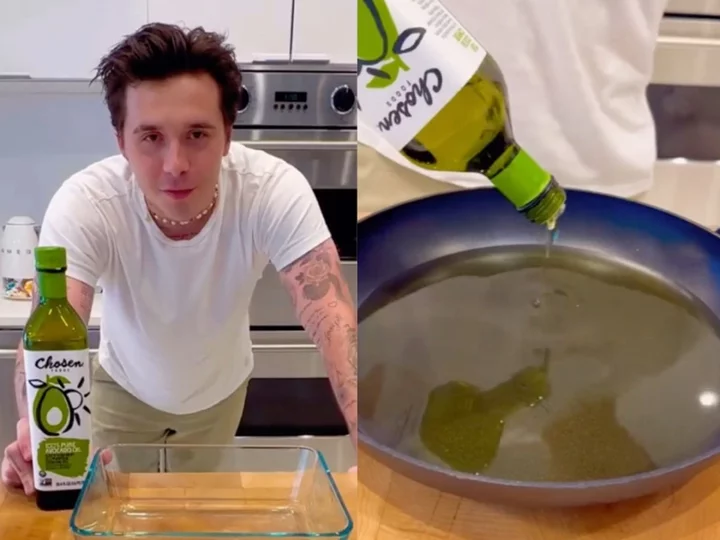
Brooklyn Beckham divides viewers with fried chicken recipe that uses large quantity of ‘expensive’ oil
Brooklyn Beckham has come under scrutiny with his latest cooking video, which sees the aspiring home chef fry chicken using “at least $25 worth of avocado oil”. On Tuesday, Beckham, 24, the eldest son of David and Victoria Beckham, shared his newest recipe video, which was created in partnership with Chosen Foods’ avocado oil, to Instagram. “We’re going to make some fried chicken with Chosen Foods,” Beckham tells viewers at the start of the video while holding a bottle of the brand’s avocado oil, which retails from $15 to $25.99 per bottle. In the caption of the video, where Beckham confirmed the recipe is a sponsored ad for the brand, he wrote: “Fried chicken with @chosenfoods. 100 per cent Pure Avocado Oil and their Classic Avocado Oil Mayo are the best. I love Chosen Foods for frying because of its high smoke point and neutral flavour. #chosenpartner.” In the step-by-step recipe clip, Beckham filmed himself pouring milk, various seasonings and flour into a glass dish before whisking the concoction. He then proceeded to soak two chicken breasts in the mixture, before making a dry flour and seasoning mixture in a different glass bowl. The 24-year-old could then be seen pouring a liberal amount of oil into a shallow pan, with Beckham ensuring the pan was filled with several inches of the avocado oil before frying the two chicken breasts and eating them with a thumbs up. Beckham’s video has divided viewers, however, due to the amount of oil used by the former photographer to fry his chicken breasts. “That’s at least $25 worth of avocado oil,” one viewer suggested in the comments, while another speculated the amount was worth closer to “$48 of avocado oil”. Someone else wrote: “Why on earth are you deep frying in oil that costs £15/$20 per bottle? I realise this is a paid promo but do something a bit more logical like make a mayo from scratch with it, rather than dump that much into a pan to fry some chicken! #cozzielivs Brookie babes x.” According to another person, although avocado oil is “great for frying” because it has the highest smoke point of any oil, “normal people” use the “most affordable avocado oil” and “reuse it”. “Fried foods require sooo much oil, so for normal people, we have to use the most affordable avocado oil AND you can strain it and REUSE it, so if you find a $10 bottle and you use it two times, then at least it’s about $5 per use,” they wrote. “Making the simplest food with the most expensive ingredients,” someone else commented. Others called out the food “waste” in Beckham’s cooking video, with one person writing: “A whole bottle of oil for fried chicken breast? What a waste,” while another said: “There are people dying in the world from starvation - you used enough oil and milk for about 20 people. But you wouldn’t understand that.” Although many viewers were critical of Beckham’s latest recipe, some defended the former model from backlash on the basis that he likely received the oil for free as part of his partnership with the brand. “If he’s been given it or paid for it he can do what he wants with it,” one person commented. Another said: “Love using avocado oil to fry with. Avocado oil fries stuff so evenly and tastes wonderful! Keep doing your thing Brooklyn! Maybe one day you’ll have your own restaurant,” while someone else wrote: “If some people can afford it and some people can’t, what’s the problem! Leave him alone, in all this misery there is one guy happy at what he is doing! Also going to any restaurant and getting the food he is cooking would cost double! I hate moaning drama.” One fan also encouraged Beckham to “never stop” making his cooking videos, writing: “I absolutely love your cooking videos, please never stop Brooklyn!” This is not the first time that the 24-year-old has sparked a debate with one of his recipes, as he recently faced scrutiny over his recipe for grilled cheese, which saw him roast the sandwich with a blow torch, and for his recipe for spaghetti bolognese after viewers noticed a wine cork in the pot. In January, the aspiring chef also faced backlash over an “expensive” ingredient used in his recipe for a creamy truffle tagliatelle pasta, which involved creating a sauce using a generous helping of truffle before adding extra black truffle shavings as a garnish. The Independent has contacted Chosen Foods for comment. Read More Brooklyn Beckham roasted for grilling cheese toastie with blow torch: ‘And a tiny bit of salt’ Brooklyn Beckham mocked after fans spot bizarre cooking technique: ‘Cork in your pot & dog hair about to join’ Italian chef reacts to Brooklyn Beckham’s wine cork in pasta sauce ‘hack’ That’s brunch: Goan-inspired coconut and cabbage fritters If you like kulfi, you’ll love this mango and cardamom cheesecake Roasted grape, honey and feta crostinis are perfect dinner party canapes
2023-06-15 05:23
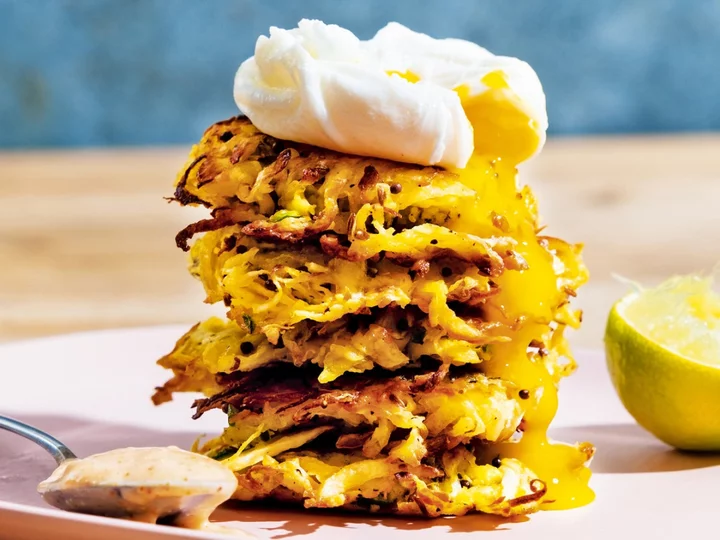
That’s brunch: Goan-inspired coconut and cabbage fritters
My mum makes this incredible stir-fried cabbage to accompany our curries, so one day, I thought, ‘I wonder how this would work as a fritter?'” says former Bake Off contestant Crystelle Pereira. “I am pleased to report that the result is an absolute delight. I fry them in coconut oil to form crispy, aromatic patties and serve them with a cooling coconut yogurt dip.” Goan-inspired coconut and cabbage fritters Makes: 3 small Ingredients: 1 large white potato (200–240g), coarsely grated 1 medium brown onion, grated 1½ teaspoons fine sea salt 5 tablespoons coconut oil 7 curry leaves 2 teaspoons cumin seeds 1 teaspoon mustard seeds ¼ white cabbage (130g), finely shredded (I use a mandoline) 20g desiccated coconut 2 large eggs ¼ teaspoon ground turmeric 2 tablespoons plain flour 1 teaspoon ground black pepper 1 thin green chilli/Indian finger chilli, finely diced For the coconut yogurt dip: 4 heaped tablespoons unsweetened coconut yogurt Juice of 1 lime ½ teaspoon garlic powdera pinch of fine sea salt ¼ teaspoon chilli powder Method: 1. Place the grated potato and onion in a bowl with ½ teaspoon salt and mix well to combine. Transfer the mixture to a large colander over a sink and allow the excess moisture to drain while you prepare the rest of the ingredients. 2. Now temper the spices. Gently heat 1 tablespoon coconut oil in a frying pan over a low heat and, once warm, add the curry leaves, cumin seeds and mustard seeds, frying for a few minutes until fragrant, making sure not to burn them as they will turn bitter. Tip these spices into a large bowl. 3. Using your hands, squeeze out as much moisture as possible from the grated potato and onion, then tip the drained mixture into the bowl with the spices, mixing well to combine. Add the cabbage, coconut, eggs, turmeric, flour, 1 teaspoon salt, pepper and diced chilli and give this one last final mix to combine everything together. 4. Now fry the fritters. Place the remaining oil in the same frying pan used to temper the spices, over a medium heat. Once the oil is hot, spoon a heaped tablespoon of the mixture into the hot oil, flattening it with the back of the spoon to make a fritter. Fry this for 2½ minutes on each side until crispy and golden, then transfer to a plate lined with kitchen paper, to soak up the excess oil. Repeat with the remaining batter. 5. Finally, make the dip. Place all the ingredients in a bowl and mix well to combine. To serve, dip the fritters in the yogurt sauce and enjoy! Recipe from ‘Flavour Kitchen: Vibrant Recipes with Creative Twists by Crystelle Pereira is published by Kyle Books, priced £22. Photography by Vanessa Lewis. Available Now.
2023-06-14 21:17
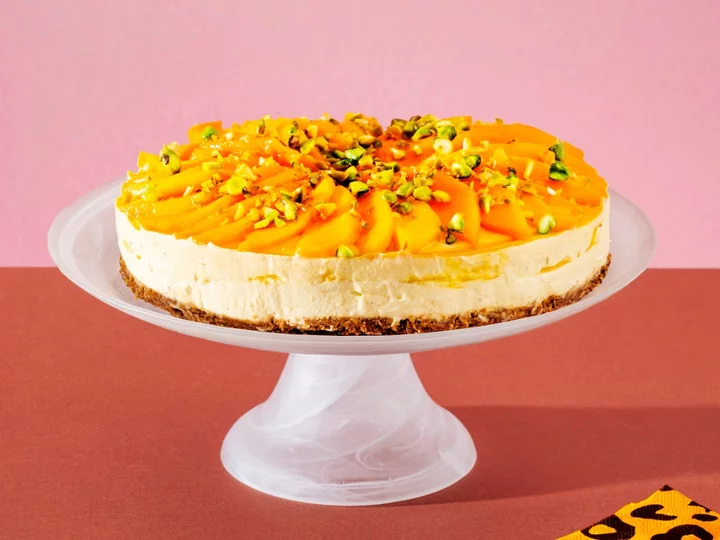
If you like kulfi, you’ll love this mango and cardamom cheesecake
I’m not sure whether you’ll have tried kulfi before, but it’s a traditional, rich ice cream found across India, that’s usually flavoured with cardamom – and I am obsessed with it,” says former Bake Off contestant Crystelle Pereira. “I once had a mango kulfi in Goa, and it was breathtakingly good. So, this cheesecake is a homage to that kulfi – the rich creaminess coming from the cream cheese, paired with sweet mango and floral notes of cardamom.” Mango and cardamom cheesecake Ingredients: For the base: 30g pistachios 30g desiccated coconut 65g unsalted butter (which will be browned so you should end up with 55g) 25g coconut oil 190g speculoos biscuits For the cheesecake: 10 cardamom pods 200ml double cream, cold 55g icing sugar 1 teaspoon vanilla bean paste 600g cream cheese 2 tablespoons runny honey 185g canned, sweetened mango purée To decorate: 1 fresh mango/1 x 425g (before draining) can of mango 1 tablespoon runny honey Small handful of pistachios Method: 1. First make the base. Place the pistachios and desiccated coconut in a frying Pan over a low heat and toast, stirring, for about 7 minutes until the coconut is golden and nutty. Remove from the heat and set aside. 2. Place the butter in a saucepan over a low heat and stir constantly until you see it bubble up vigorously with a thick, cappuccino-like foam, and then light brown solids will start to form on the bottom. At this point, take the pan off the heat, stirring for about 30 more seconds, then immediately transfer it to another bowl, making sure to scrape out all the solids from the bottom, as these carry so much flavour. Then, stir through the coconut oil until it has melted in the residual heat. 3. Place the speculoos biscuits in a sealed freezer bag and bash with a rolling pin until the mixture resembles fine crumbs. Then, add the coconut and pistachios and bash these again to break down the nuts slightly (you can also use a food processor). Tip all the contents into a large bowl and mix with the brown butter and oil until the mixture resembles wet sand. 4. Press this into the base of a 20cm springform cake tin, and use the base of a mug to flatten it down. Transfer to the fridge to chill and harden while you make the cheesecake filling. 5. Place the cardamom pods in a dry frying pan over a low heat and toast, stirring, for about 10 minutes until fragrant. Transfer to a pestle and mortar and bash to release the seeds from the shells. Discard the shells (I keep mine and add them to my chai), then grind the seeds into a fine powder. You can also grind the whole pods, including the shells, in a spice grinder. 6. In a large bowl, place the double cream, icing sugar, vanilla bean paste and ground cardamom and whisk to fairly stiff peaks. 7. In a separate bowl, combine the cream cheese, runny honey and 150g of the mango purée and whisk well to combine. Then, fold through the whipped cream into this cream cheese mixture in three parts, until no streaks remain. 8. Remove the base from the fridge and pour half the cheesecake mixture over the top. Then, swirl through half the remaining mango purée and use a knife or skewer to swirl this through the mixture. Then repeat with the remaining cheesecake mixture and mango purée and use an offset spatula to level the top. Place in the fridge for 6–8 hours, or ideally overnight, until completely set. 9. To serve, run a palette knife or offset spatula around the rim of the cheesecake and then carefully release the springform tin and slide off the metal base. 10. Thinly slice fresh (or canned) mango, and arrange on top of the cheesecake, drizzle over some honey, and sprinkle with pistachios, then slice and serve. Recipe from ‘Flavour Kitchen: Vibrant Recipes with Creative Twists’ by Crystelle Pereira (Kyle Books, £22). Read More BBQ salad recipes without a soggy lettuce leaf in sight Grace Dent’s quick and easy recipes that only require the microwave How to shop for and cook Japanese food at home like a pro Crystelle Pereira: ‘This is controversial but... French food isn’t that great’ Roasted grape, honey and feta crostinis are perfect dinner party canapes Forest Side, review: Cumbrian produce elevated to Michelin-starred proportions
2023-06-14 19:23
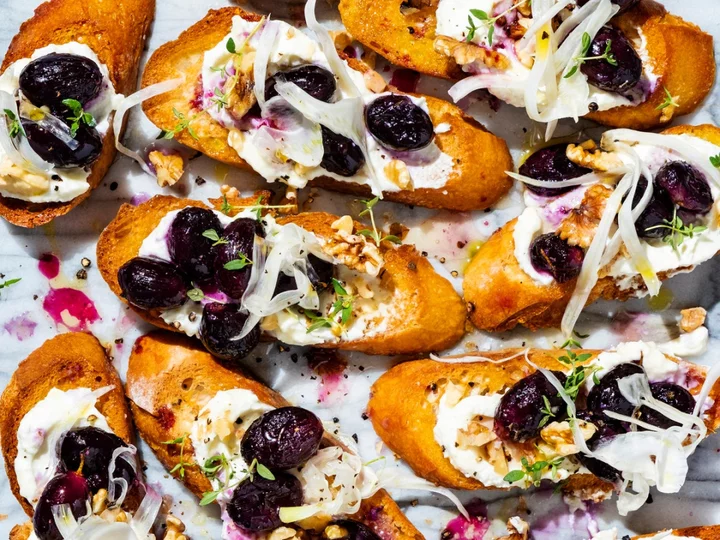
Roasted grape, honey and feta crostinis are perfect dinner party canapes
This creation is heavily inspired by one of my favourite signature bakes in the Bake Off tent,” says Crystelle Pereira, who was a runner-up on the show in 2021. “I had made a focaccia during Bread Week, with roasted grapes, sharp, salty feta, crunchy walnuts and fresh fennel. “It went down a treat, and so I’ve transferred all of the same flavours and textures into crispy crostini – little bites of sweet and salty deliciousness.” Roasted grape, honey and feta crostini Ingredients: For the infused oil: 50ml olive oil 2 garlic cloves, grated ½ tablespoon dried thyme For the crostini: 240g black seedless grapes (about 24 grapes) 200g feta 10 walnuts, skin on 1 small baguette 1½ tablespoons runny honey ¼ fresh fennel bulb, thinly sliced (optional) A bunch of fresh thymea pinch of fine sea salt and ground black pepper Method: 1. Preheat the oven to 180C fan/400F/gas mark 6. 2. First make the infused oil. Place the olive oil in a small saucepan with the garlic and thyme and heat very gently over a low heat for about 10 minutes, until the oil is sizzling and fragrant. Turn off the heat and set aside. 3. Arrange the grapes in a roasting tray and spoon over 3 teaspoons of the infused oil. Toss the grapes until they are coated, then place in the oven and roast for 20 minutes, until they are sizzling and the skins have shrivelled slightly. Allow to cool, then slice each grape in half lengthways. 4. Place the feta in a food processor with a splash of feta water (or a splash of milk if your feta does not have water), a good pinch of pepper and a tiny pinch of salt and blend until completely smooth. 5. Place the walnuts in a dry frying pan over a medium heat and toast for around 7 minutes until slightly browned and fragrant. Allow to cool slightly, then break into small pieces and set aside. 6. Slice the baguette diagonally into thin crostini slices (about 1.5cm thick) and drizzle a teaspoon of the infused oil over each slice. Place these on a tray and toast in the oven for 7–10 minutes until crispy and golden, or alternatively cook on a griddle pan over a high heat for 4 minutes, flipping halfway through. 7. To assemble, spread 1 heaped teaspoon of whipped feta over each crostini and drizzle with honey. Top with about 4 grape halves and a scatter of fennel, crushed walnuts and fresh thyme leaves, and serve straight away. Recipe from ‘Flavour Kitchen: Vibrant Recipes with Creative Twists’ by Crystelle Pereira (Kyle Books, £22). Read More BBQ salad recipes without a soggy lettuce leaf in sight Grace Dent’s quick and easy recipes that only require the microwave How to shop for and cook Japanese food at home like a pro Crystelle Pereira: ‘This is controversial but... French food isn’t that great’ Forest Side, review: Cumbrian produce elevated to Michelin-starred proportions Showstopping BBQ main dishes for a hot grill summer
2023-06-14 17:17
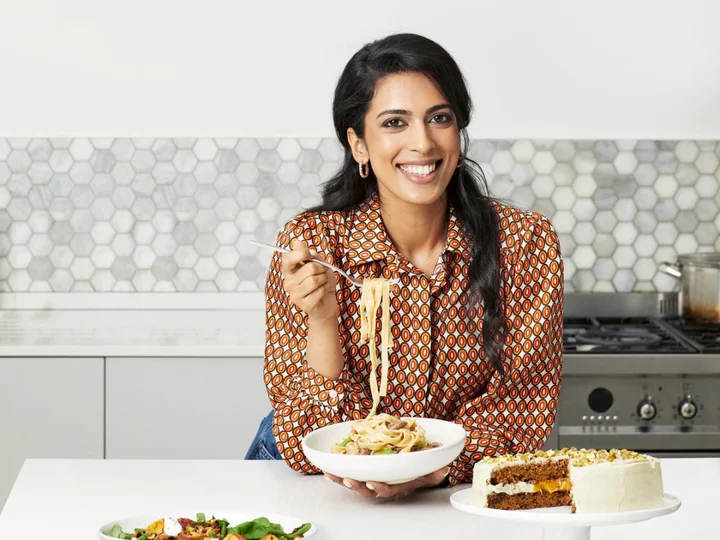
Crystelle Pereira: ‘This is controversial but... French food isn’t that great’
Crystelle Pereira can’t believe how time has flown in the two years since she competed in the Great British Bake Off. “Since I hit send on that application, it’s literally felt like I have just hit, like, times 10 in speed of life!” she tells me, wide-eyed, on a video call from the home in North London she shares with her parents and one of her two sisters. The 28-year-old – who finished runner-up to Giuseppe Dell’Anno in the 2021 season – was working in a fast-paced finance job when she took part. Landing a book deal shortly after the series aired (seven publishers were vying for her signature), she waited seven months before handing in her notice to pursue a cookery career. “I wouldn’t say I’m a pessimist, but I’m a realist,” the London-born cook says. “It’s very easy to quit your job and think, ‘Oh my gosh, I’m famous, this is great’. But I thought, ‘I don’t want to quit my job blindly and chase my dreams’. I need to think, ‘Is this viable? Can I actually get work?'” How did she decide to finally take the plunge? “It got to a point where I was like, I’m just working two full-time jobs – I’ve got no more annual leave, I’m about to burn out. “And also I need to grab this opportunity with both hands and just do it [otherwise] I think I’ll always regret it.” She hasn’t looked back since: “Honestly, it’s the best decision I’ve made. [Cooking] is literally my full-time job, it’s no longer a side hobby that I rush to do after I finish a long day of work. “It means I’ve got more time to really put into my job, I’m free to go on trips to Italy to look at Parmesan,” (an excursion she’s embarking on soon) “and obviously doing my book took up so much time.” Flavour Kitchen, her debut cookbook, is a colourful ode to Pereira’s Portuguese-Goan heritage (her parents met in Mumbai before moving to the UK). Split into two halves, the savoury section features brunch bites, curries, pasta, noodles, salads and more, all bursting with international flavours, such as Goan chilli chicken fry, kimcheese toasty, and honey and chipotle baked camembert. The sweet half is all about cakes, cookies, pies and other treats with a twist. Bake Off fans will remember the pistachio, orange and cardamom carrot cake Pereira created for her final Signature Challenge. “Goa is in the south of India, and it was colonised by the Portuguese,” Pereira says, which is why Goan food is so different to the rest of Indian cuisine. Vindaloo curry, for example, has its roots in Europe: “The Portuguese had this dish called carne de vinha d’alhos, a pork and wine dish. The Goans took that and swapped Portuguese wine with Goan vinegar and that became vindaloo.” Many of the savoury recipes in Flavour Kitchen feature a liberal splash of the tangy liquid. “Our food is very vinegar-based, which sounds a bit off-putting but it just works because it’s all balanced really well,” Pereira says. “If something’s got lots of vinegar, then it’s offset with something sweet like jaggery, which is an unrefined sugar, or coconut, because coconuts are in abundance in Goa.” Given the choice, the adventurous cook would much rather tuck into fiery fish curry, egg fried rice with Korean gochujang chilli paste or noodles with “about 10 cloves of garlic” than a plate of pretentious haute cuisine. “I will be honest, this is really controversial…” she begins, pausing before admitting: “I’m not that big on French food.” Conceding that Parisian pastries are unbeatable, she continues: “I’m just more into pan-Asian and Mediterranean food – I just think the flavours are a bit more vibrant. “Like you think about South Korea, you think about gochujang; in Greece you think about fresh mint, coriander, lemon, halloumi; Mexico, you’ve got chipotle; go to the Middle East, you’ve got harissa, ras el hanout [spice mix], all these flavours.” The cook credits her mum and dad’s cooking for helping her develop a taste for the exotic, and her late grandad – to whom she dedicates the book – with overseeing her success. “He sadly he passed away before any of this took off, but I genuinely believe in life after death – I genuinely believe he’s been a big part in guiding me through all of this. “I think he just knew l was going to end up in food. Funnily enough he used to call me MasterChef – we used to watch a lot of cooking shows together.” Having amassed 190,000 Instagram followers and cooked live on Good Morning America, The Today Show and ITV’s Lorraine, Pereira is well on her way to celebrity chef status. There have been many a pinch-me moment during her first year as a fully-fledged foodie, none more surreal than when she met King Charles (at that point still a Prince) at a Queen’s Jubilee lunch event last summer. “[Charles and Camilla] turned up and I thought, ‘I’m sure they won’t come over to speak to us,” Pereira recalls. “All of a sudden he’s walked over and said, ‘Oh, do you mind if I sit there? Because there was a seat next to me.” What did the pair talk about? “I think I was just word-vomiting! I said ‘Do you like baked goods?’ and ‘Do you bake?’ “The general consensus was he doesn’t bake, but he does like to eat. He likes cakes, he likes Italian cuisine. And then I was just talking to him about my style of baking and stuff. We had a merry old chat!” As well as finding herself starstruck by royals, Pereira has had to get used to being recognised by fans: “It literally happened the day after the first episode, which was wild. “I was going to work, I was on the train platform – I had a mask on my face, which is even funnier. This girl comes up to me and goes, ‘Oh my gosh, are you Crystelle from Bake Off?” Though she was recently “so embarassed” to be spotted at the end of spin class while “red and sweaty”, being asked for selfies is a small price to pay for being able to live out her dream. “I will never complain,” she says. “Like, no one’s there like throwing things at me! If I bump into anyone on the train or on holiday or whatever everyone is genuinely so lovely, so it’s actually just really nice to be honest.” ‘Flavour Kitchen: Vibrant Recipes with Creative Twists’ by Crystelle Pereira (Kyle Books, £22).
2023-06-14 13:59

Biggest Losers of AI Boom Are Knowledge Workers, McKinsey Says
The worldwide boom in generative artificial intelligence will usher in an age of accelerated productivity and greater prosperity
2023-06-14 12:52

Americans are drinking alcohol at levels not seen since the Civil War, report says
As if 2023 wasn’t hard enough, Americans are now drinking as much alcohol as they did during the Civil War days. A new report from the National Institute on Alcohol Abuse and Alcoholism (NIAAA) has found that the average American drinks about the same amount of alcohol as people did in 1860. In 2021, Americans consumed 2.51 gallons of ethanol – the alcohol found in wine, beer, and spirits – compared to 2.53 gallons at the brink of the Civil War. That amount, which doesn’t include water or other ingredients found in alcoholic beverages, marks a 60 per cent increase in liquor consumption compared to the mid-1990s. Americans have also changed their taste for alcohol. The amount of beer consumed has dropped nearly 20 per cent since 1995, while wine has steadily become America’s drink of choice. Now, 50 per cent more Americans are drinking wine than they did in the mid-1990s. This isn’t the only time the United States has seen staggering levels of alcohol consumption. In 1934, following the repeal of the Prohibition Act, Americans were drinking one gallon of ethanol per person. At the end of World War II in 1945, Americans reached 2.3 gallons. This, compared to 2.8 gallons in 1980, when alcohol consumption was at its highest. The rise in alcohol consumption may also have to do with a key demographic: women. In March, it was revealed that women in the US are out-drinking men for the first time in history. Dr George Koob, director of the NIAAA, recently told the Washington Examiner that binge drinking among college students are to blame. “In 2021, there has been an uptick, particularly among women. Now it turns out on college campuses women are actually binge drinking more than men, for the first time in history,” he told the conservative media outlet. The Covid-19 pandemic also saw a dramatic shift in alcohol consumption, as most states declared liquor stores were considered “essential businesses”. In 2020, the first year of the pandemic, sales of alcohol increased by 2.9 per cent, the biggest annual increase in more than 50 years, according to the NIAAA. Now, with college campuses back in session and local bars open again, Koob attributed the rising trend of women binge drinking to the “alcohol deprivation effect” – in which people “rebound in drinking” after a period of abstaining from alcohol. “A standard drink is 1.5 ounces of vodka, 12 ounces of beer, or five ounces of wine,” he said. “When you go past a standard drink, you really are getting to the point where alcohol ultimately becomes a toxin. You can easily overdose.” The Centers for Disease Control and Prevention (CDC) says that it’s safe for women to drink no more than one standard alcoholic beverage a day, and no more than two for men. However, binge drinking usually corresponds to five or more drinks on a single occasion for men, while four or more drinks on a single occasion for women. Read More Moderate alcohol consumption may lower stress, reduce heart disease risk, study finds Man dies after eating raw oysters from Missouri seafood stand Hip surgery policies based on weight ‘worsen health inequality’, study warns TikToker cooks rack of ribs in hotel bathroom using only items from his room BBQ salad recipes without a soggy lettuce leaf in sight How to shop for and cook Japanese food at home like a pro
2023-06-14 08:27
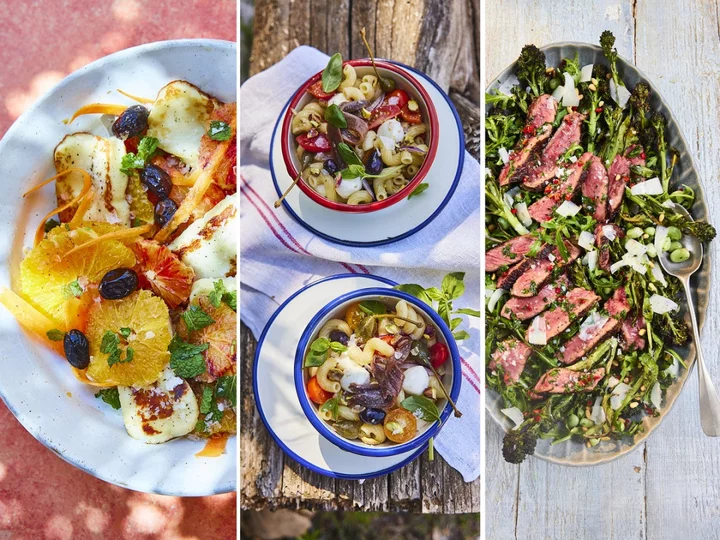
BBQ salad recipes without a soggy lettuce leaf in sight
BBQs are just as much about the side dishes as they are the burgers and various grilled meats, but that doesn’t mean you’re limited to serving soggy lettuce. These Maldon Salt salad recipes deliver on everything from a fresh and vibrant orange and carrot salad with halloumi, to a light but flavour-packed pasta salad. Or get your greens in with a steak salad with broccoli, parmesan, and a chilli and herb dressing. Orange and carrot salad with grilled halloumi This orange and carrot salad, paired with barbecue grilled halloumi creates the perfect salad for any summer dinner party. Ingredients: 2 Navel oranges 2 blood oranges 2 carrots 200g halloumi cheese 2 tbsp black olives 2 sprigs of fresh mint 4 tbsp extra virgin olive oil Maldon Salt 1 pinch of cumin Freshly ground black pepper Method: 1. Wash, dry and de-leaf the fresh mint. Set aside a few whole leaves and chop up the rest finely. Juice ½ a blood orange, filter out the excess bits/pips with a sieve, then season the juice with Maldon Salt and pepper. Add the olive oil, cumin and chopped mint and mix together well. Put this salad dressing in the fridge for later. 2. Cut the peel and pith away from the rest of the oranges with a very sharp knife until the pulp is completely clean. Cut each orange into segments and toss into a salad bowl. Using a vegetable peeler, finely shred the peeled carrots into the bowl, and add the olives and salad dressing together. 3. Chop the halloumi into thin slices, lightly brush with olive oil and then grill on the barbecue until golden on both sides. Serve together with the salad. Add a pinch of Maldon Salt for seasoning. Pasta salad The simple yet delicious pasta salad is easy to make, perfect for the hot summer months when craving for something light but packed full of flavour. Ingredients: 350g short pasta 150g cherry tomatoes 1 bag of mini mozzarella balls 16 black olives 8 anchovy fillets in oil 2 tbsp chopped toasted pistachios or pine nuts 16 capers ¼ medium red onion 4 tbsp extra virgin olive oil 4 sprigs of fresh basil with small leaves Maldon Salt Black pepper Method: 1. Wash, dry and chop the tomatoes into eighths, place them in a salad bowl and season with Maldon Salt and pepper. 2. Add the drained mozzarella balls, olives, capers and chopped onion and drizzle with olive oil. Drain the anchovies and add to the mix. Wash and dry the basil and then remove the leaves from the stem. 3. Cook the pasta al dente in plenty of salted water, according to the instructions on the packet, then drain and cool under cold running water. Once fully drained, mix the pasta in with the rest of the ingredients in the salad bowl. 4. To plate up, place the anchovies on top, sprinkle on the pistachios and basil leaves and serve at room temperature. Steak salad with purple broccoli, parmesan, and chilli and herb dressing A beautiful seared steak salad recipe paired with the best in season purple sprouting broccoli and broad beans. Ingredients: 400g sirloin steak 100ml plive oil, plus extra for frying A handful of chopped parsley A handful of chopped coriander 1 red chilli, deseeded and finely chopped 200g purple sprouting broccoli 150g broad beans, blanched 50g wild rocket 25g aged parmesan 20g toasted pine nuts A pinch of Maldon Salt Method: 1. Preheat the oven to 180C. 2. Begin by cooking the steak. Make sure your meat is out of the fridge 30 minutes before you want to cook it, so it has time to come up to room temperature. Get a frying pan or griddle pan on the heat get it to a nice high heat. Drizzle some olive oil onto your steak and season generously with Maldon salt and cracked black pepper. Once the pan is nice a hot, place the meat in and allow it to sear and sizzle on one side first. Depending on the size of your steak this can take a good 5 minutes on each side. You want good, deep caramelization on all sides of the meat. 3. While the meat is cooking place the purple sprouting broccoli onto a baking tray and drizzle over some oil and a pinch of Maldon salt. Place the tray into the oven and roast the broccoli for 10-12 minutes until tender and starting to char slightly. 4. Once the steak is cooked to your liking – we’ve served it medium rare here – remove from the pan and leave it to rest on a chopping board. The resting time is key! It helps keep all the cooking juices to stay absorbed inside before slicing. 5. While your meat rests, prepare the rest of the salad. Place the olive oil in a small bowl and mix with the chopped parsley and coriander, the diced red chilli and some Maldon salt and cracked black pepper. Set this dressing aside. 6. On a large platter scatter over the wild rocket. Next top this with the roasted broccoli and the blanched broad beans. 7. The meat will be rested now, so carefully slice at a diagonal into thin slices. Place this over the salad. Any meat juices that are left on the board can be carefully poured into the bowl with the dressing ingredients. 8. Drizzle over the dressing, shave some parmesan across the top and sprinkle over toasted pine nuts. Give the whole salad a final pinch of Maldon salt and some cracked black pepper and then serve. Recipes from Maldon Salt. Find more at maldonsalt.com/recipes-tips-blog
2023-06-13 20:49
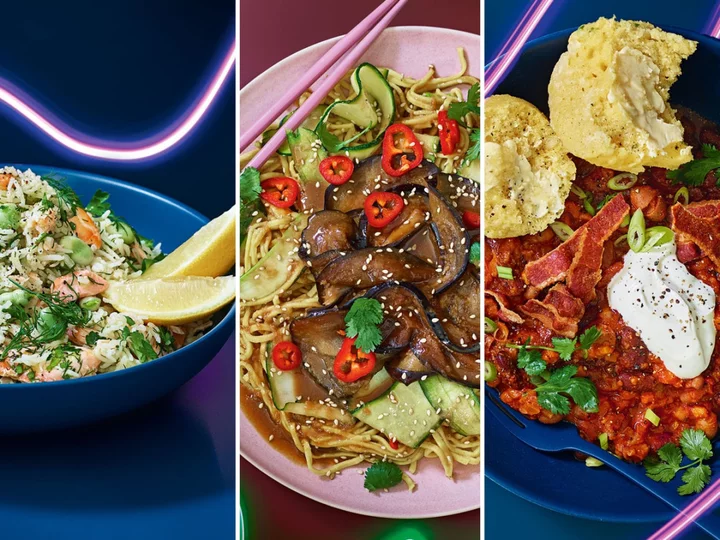
Magic of the microwave: Forget the oven with these three quick and easy recipes
Joining the Dent family in 1985, our microwave had somewhat of a bad start. It arrived, fresh out the box from Comet, in the midst of an argument. My mam had not greenlit the purchase of this cumbersome stainless-steel cube, with a vivid orange door, that Dad and I were loading onto her already packed kitchen worktop. She did not share our enthusiasm for this magical, space-age item we’d seen on BBC’s Tomorrow’s World and knew would take our snacking into the future. She was mainly outraged at the whopping £100 sum I’d cajoled Dad into spending. “I don’t trust it,” said Mam, reeling off a list of concerns, including microwaved innards, catastrophic explosions and partially cooked food giving us rampant salmonella. The truth was a little less exciting: I remember us loading the first maris piper inside, pricked all over with a fork, blasting it on HIGH for seven minutes, hoping for a crisp, fluffy jacket spud, only to find a rock-hard lump with a thin, waxy skin that hissed and spat from the holes. “See? Useless!” said Mam. My dad and I were sheepish. But as the weeks went on, Mam’s attitude to the microwave softened. For a start, it was saving her a fortune on gas as we almost stopped using the hobs for tinned spaghetti, soup, baked beans, tinned custard. Plus, the defrost button meant we now had access to all those mystery items she’d deep-frozen months back. Potato became a thing of joy as we discovered “micro-mash” (real potato, already peeled, mashed and frozen). Mam and Dad worked, so now my brother Dave and I could rush home from school and warm up glamorous microwave meals we’d begged Mam for on the big Friday shop. Macaroni cheese in a plastic tray! Microwave chips in a box! We learned how to heat food thoroughly, stopping halfway to give it a stir, before lazing on the couch, watching Miami Vice with our microwave chicken chow mein, feeling like we were fully living the dream. Nowadays, I try to limit my intake of such shiny-packeted E-number-filled joys; but still, I can’t live without my small, sleek, silver microwave. Life is too short to use a pan for frozen peas or spaghetti hoops; and how would I live without a quick 800W blast to thaw and separate veggie sausages before hurling them in the air fryer, or to defrost frozen mince before whipping up a quick chilli? Some foodie types are snobbish about the microwave; I see it as a loyal friend who has had my back for over 30 years Watt’s on the menu? Make the most of your microwave to conjure up clever meals that save on time and energy use. These ingenious recipes are from Ocadolife. Easy perfect rice with smoked trout and broad beans If you have trouble boiling rice on the hob, you’re going to love this method. It’s super-easy and yields flawless results every time. Here, it’s teamed with a summery combination of pink fish, vibrant herbs and a zingy dressing. Serves: 4 Hands-on time: 15 mins | Total time: 20 mins, plus standing (based on an 800W microwave at full power) Ingredients, available from Ocado: 250g basmati rice, rinsed 500ml hot vegetable stock 300g frozen broad beans Zest and juice of 1 unwaxed lemon, plus extra wedges for squeezing 1 garlic clove, crushed or grated 2 tbsp olive oil handful of flat-leaf parsley, roughly chopped Small bunch of dill, roughly chopped 2 x 100g packs M&S Scottish Loch Trout Flakes Method: 1. Put the rice in a large microwave-safe bowl. Pour the stock over the rice; stir well. Cover (if using microwave-safe wrap, pierce to let the steam escape); sit the bowl on a microwave-safe plate to catch drips and microwave for 12 mins. Remove; leave to stand, covered, for 10 mins. 2. Meanwhile, put the broad beans in another microwave-safe bowl with a few splashes of water, cover with a microwave-safe plate and blast for 2 mins. Remove, tip into a colander and refresh under cold running water until cooled; drain well. 3. Stir the broad beans into the rice, with the lemon zest and juice, garlic, olive oil, most of the herbs and plenty of seasoning. Fold through the trout. Divide between 4 plates and scatter over the remaining herbs. Serve with lemon wedges for squeezing. Per serving: 428cals, 1 veg portion, 10g fat (2g saturated), 22g protein, 59g carbs, 2g sugar, 7g fi bre, 1.7g salt Saucy supper silky aubergine and courgette noodles Microwaving cooks food from the inside out, so you can say goodbye to spongy aubergines and hello to beautifully soft flesh that soaks up the marinade as it cooks. Serves: 4 Hands-on/total time: 20 mins (based on an 800W microwave at full power) Ingredients available from Ocado: 2 aubergines, each cut lengthways into 8 pieces 100g egg noodles 1 large courgette, peeled into ribbons Large handful of coriander, roughly chopped 1 red chilli, sliced 1 tbsp sesame seeds, toasted For the marinade: 4 tbsp soy sauce 3 tbsp rice wine vinegar 1 tbsp sesame oil 2 garlic cloves, crushed or grated 3cm piece ginger, grated 1 tbsp miso paste 1 tsp caster sugar Method: 1. Combine all the marinade ingredients in a large microwave-safe bowl. Add the aubergine; toss to coat. Cover (if using microwave-safe wrap, pierce a couple of times to let the steam escape); microwave for 12 mins, stirring halfway, until cooked through. 2. Meanwhile, put the noodles in a heatproof bowl and cover with boiling water. Leave to stand for 3 mins or until tender. Put the courgette ribbons into a sieve, then drain the noodles over them – the residual heat will soften the courgette slightly. 3. Divide the noodles and courgette between 4 plates. Top with the aubergines, spooning over any remaining sauce. Scatter over the coriander and chilli, sprinkle with the toasted sesame seeds and serve immediately. Cover leftovers and chill for up to 2 days. Reheat in the microwave until piping hot. Per serving: 357cals, 1 veg portion, 5g fat (1g saturated), 13g protein, 60g carbs, 9g sugar, 9g fibre, 3.4g salt, £1.37 per portion Smoky bean chilli with cornbread and crispy bacon With no frying odours or splattered grease, bacon in the microwave is almost too good to be true – especially teamed with this delicious chilli and cheesy cornbread. Serves: 4 Hands-on time: 20 mins | Total time: 30 mins (based on an 800W microwave at full power) Ingredients available from Ocado: Six rashers dry-cured smoked streaky bacon For the cornbread: 2 tbsp unsalted butter, plus extra for spreading (optional) 5 tbsp plain flour 5 tbsp fine cornmeal or polenta 1 tsp baking powder 1 tbsp caster sugar 2 medium eggs, lightly beaten 6 tbsp natural yoghurt 1 green chilli, finely chopped (optional) 50g cheddar, finely grated For the chilli: 150g soffritto mix (we used Cook With M&S Frozen Soffritto Base, defrosted) 1 garlic clove, crushed or grated 2 tsp ground cumin 2 tsp smoked paprika 1 tsp dried oregano 1 tbsp olive oil 2 x 400g tins mixed beans, drained (splash of liquid reserved) 350g passata To serve (optional): Soured cream Handful of coriander, leaves picked 2 salad onions, chopped Method: 1. For the cornbread, put 1tbsp butter into each of 2 large mugs (preferably straight-sided). Microwave for 20 secs or until melted. Carefully swirl the butter around in the mugs so it greases the sides, then tip the excess out into a mixing bowl. Set the mugs aside. 2. Add the remaining cornbread ingredients to the bowl, reserving a little of the grated cheese. Season well, then stir until combined. 3. Divide the mixture equally between the 2 mugs and sprinkle over the remaining cheese. Microwave them separately for 1½-2 mins or until risen and springy. Run a knife around the edge of the cornbread to loosen; turn out onto a wire rack to cool. 4. For the chilli, put the soffritto, garlic, spices, oregano and oil into a large microwave-safe bowl. Cook for 3 mins, stirring halfway. 5. Add the beans (and a splash of liquid), passata and seasoning to the bowl; stir well. Cover (if using microwave-safe wrap, pierce a couple of times to let the steam escape), and cook for 5 mins, stirring halfway. Leave to stand while you cook the bacon. 6. Put 2 sheets of kitchen towel on a microwave-safe plate and lay the bacon in a single layer. Cover with another sheet of kitchen towel. Microwave for 1 min, then check to see if it’s crisp and starting to curl. If not, continue cooking in 20-sec bursts, being careful not to burn it. Break into shards. 7. Uncover the chilli (open it away from you to avoid the steam) and ladle into bowls. Top with a dollop of soured cream, the coriander and salad onions (if using), and the bacon. Serve with the cornbread, buttered if you like, for scooping. Leftover chilli will keep covered and chilled for 3 days. The cornbread is best eaten on the day of cooking. Per serving: 613cals, 2 veg portions, 29g fat (12g saturated), 30g protein, 54g carbs, 10g sugar, 9g fi bre, 2g salt, £1.60 per portion Read More How to shop for and cook Japanese food at home like a pro Forest Side, review: Cumbrian produce elevated to Michelin-starred proportions Showstopping BBQ main dishes for a hot grill summer 7 TikTok food hacks that actually work Saltie Girl in Mayfair will make you happy as a clam – as long as you can afford it Chef Ravinder Bhogal: Vegetables are the secret to saving money
2023-06-12 13:59

How to shop for and cook Japanese food at home like a pro
The dinner rotation is an unspoken, yet essential schedule. Most of us have five or six reliable recipes tucked away in our back pockets, ready to be pulled out at a moment’s notice. Sometimes this means cooking the same dishes week in, week out. Venturing outside this routine should be an exciting prospect. Maybe you’ve been inspired by a travel documentary or a new cookbook caught your eye. It doesn’t look that hard, right? But hunting down the right ingredients can feel like a minefield when you don’t really know what you’re looking for or even where to find them. Shopping well is crucial for success in the kitchen. God only knows the number of times I’ve come home with the wrong thing or given up because I was overwhelmed by the supermarket aisles. What if I end up wasting money on a new meal that turns out catastrophic? Some cuisines are more daunting than others. Japanese food has such a reputation for perfection that the idea of making anything other than a katsu at home terrifies me. But it wouldn’t be so scary if I had a real-life expert to walk me through the supermarket shelves, show me what to look for and demonstrate that I could indeed be churning out beautiful sushi, delicious broths and other Japanese dishes from my humble kitchen. Enter: cookbook author and teacher, Atsuko Ikeda, who has offered to take me to an Asian cash and carry to teach me how to shop for Japanese ingredients. We meet at Tazaki, a major distributor of Asian ingredients in the UK that has a warehouse in North Greenwich. It was previously owned by SeeWoo but was acquired by Tazaki last year and is currently in the process of revamping stock. However, it still carries just about everything you need to get started on a Japanese culinary adventure. Ikeda, who has authored three cookbooks on Japanese small plates, comfort food and sushi, is a frequent visitor. We begin by perusing the fresh ingredients, like daikon (white winter radish), whole lotus root and mustard greens. The whole lotus root can be sliced thinly and fried to make crispy lotus chips, while the snow-white daikon can be grated into sauce or cubed and added to soups. But we’re starting simpler. Ikeda picks up shimeji mushrooms, small round cap fungi with medium-length stems that grow from a single base. These have an earthier flavour and are denser in texture than regular button or chestnut mushrooms, which means they retain their size and shape a little better. Spring onions, avocado and carrots also make it into the basket, common vegetables that can be found in any supermarket. We move onto carbs and delve into the rice section. As Ikeda is teaching me how to make sushi later, she explains that it is made with Japanese short-grain rice; it has a more glutinous, starchy texture than long-grain rice, which is more popular in the UK. This starchy quality of short-grain rice makes it stickier, an essential feature to make sure sushi rolls and nigiri bites don’t fall apart. A trusted brand for most Japanese ingredients, including sushi rice, is Yutaka, which can be found almost anywhere – I’ve seen it stocked in my local fishmonger. Plenty of other brands abound, with some supermarkets even providing their own brand products, but Ikeda’s recommendation goes straight into my basket. She points out a variety of noodles, and we’re talking much more than udon. There are bouncy shirataki noodles, almost transparent noodles made from konjac yam that can be eaten hot or cold. You can purchase frozen ramen noodles if you’re experimenting with making your own ramen, but Ikeda winks as she tells me she usually just goes to her favourite ramen shop when she’s craving it. Soba noodles, which can be bought dried, are perfect for the summer when tossed into a cold peanut sauce with an assortment of vegetables. The list goes on and on, but Ikeda reassures me that most noodles are versatile and it mainly depends on what type of texture you’re going for rather than flavour. Next is the condiments aisle, where miso resides (can miso be considered a condiment? I’m not so sure). Miso is, of course, a must-have staple. Ikeda points out three types: white miso, sweet rice miso and barley miso. Later, when we taste them, I’m surprised to learn how vastly different they taste from one another. The white miso, which is the most common type used in recipes, has a slight tang and a savouriness that makes your mouth water, while the barley has a deeper, maltier flavour that is mcuh more comforting. I highly recommend buying different types to taste for yourself. Ikeda also introduces me to yuzugosho, a spicy, tart condiment containing the yuzu fruit and fiery green chillies. It brought a tear to my eye, both from the heat and delicious flavour. Ikeda also teaches me that most commercial wasabi contains more horseradish than wasabi, so buyer beware: if you’re seeking the real deal, you may have to be prepared to shell out more money than you initially think. Some brands are 100 per cent horseradish, marketed as wasabi, so checking the label is essential. The same goes for mirin, a Japanese sweet rice wine which varies in alcohol content. A good rule of thumb is that the cheaper the mirin, the lower the alcohol content. Soy sauce is another staple for most Asian cuisines, but there are differences. Ikeda prefers to use tamari soy sauce, which is thicker and, I find, not as intensely salty as the soy sauce you usually get in tiny fish-shaped plastic bottles from takeaways. At home, I’m a Kikkoman soy sauce fan, but Ikeda recommends Yutaka’s organic tamari soy sauce for a more mellow, sweeter flavour. In terms of proteins, it depends on what dish you want. We’re focused on fish, particularly sushi-grade salmon, which you can buy from Tazaki or most fishmongers. This is where I’m especially nervous, because it’s easy to get the cut wrong. However, knowledgeable fishmongers are your best friends when it comes to choosing the cut, so ask plenty of questions. Ikeda shows me how to slice the salmon for different types of sushi rolls and nigiri, as well as how to steam the fish in a baking parchment parcel, slathered in miso and accompanied by the shimeji mushrooms we’d purchased earlier. You can also add fish roe or masago caviar to your Japanese dishes. The bright orange spheres add a unique saltiness and a satisfying texture to sushi, but can also be used to top rice dishes or stirred through Japanese-inspired pastas. A reliable brand is Elsinore, which can be found in Waitrose. I still find the idea of making sushi daunting, but the supermarket aisles no longer feel so intimidating now that I have a clearer idea of what to look for. It reminds me of how fun it is to try something new in the kitchen and, armed with cookbooks from the experts, the delicious results will keep me coming back for more. Read More Grace Dent’s quick and easy recipes that only require the microwave Forest Side, review: Cumbrian produce elevated to Michelin-starred proportions Showstopping BBQ main dishes for a hot grill summer 7 TikTok food hacks that actually work Saltie Girl in Mayfair will make you happy as a clam – as long as you can afford it Chef Ravinder Bhogal: Vegetables are the secret to saving money
2023-06-12 13:58
